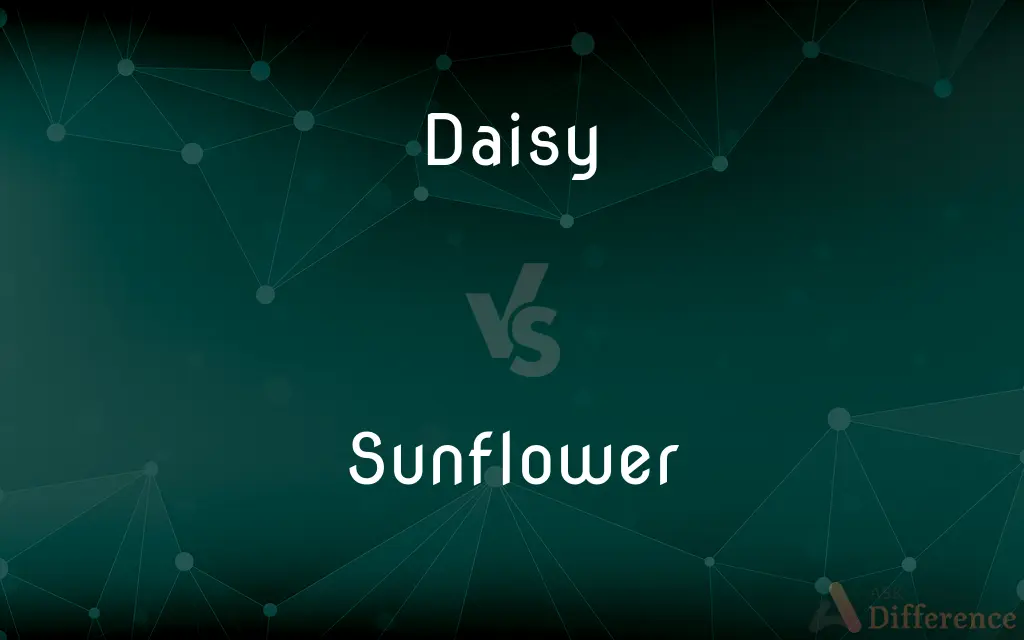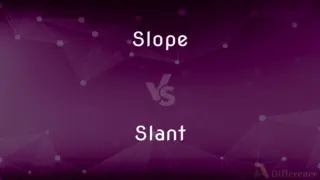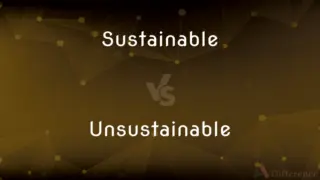Daisy vs. Sunflower — What's the Difference?
Edited by Tayyaba Rehman — By Fiza Rafique — Updated on November 3, 2023
Daisies are small with a simple structure and a variety of colors, while sunflowers are large, have a complex structure, and are usually yellow.

Difference Between Daisy and Sunflower
Table of Contents
ADVERTISEMENT
Key Differences
Daisies are a broad genus of plants with a classic flower structure that often features white petals with a yellow center. Sunflowers, belonging to the genus Helianthus, are characterized by their large flower heads and the unique ability to turn towards the sun. Daisies are commonly associated with innocence and simplicity, while sunflowers symbolize adoration and loyalty, due to their nature of following the sun's path.
Daisies come in many sizes and varieties, from the classic lawn daisy to the larger Gerbera daisies, which have a wide range of colors. Sunflowers, however, are typically much larger and are known for their tall stalks, which can grow several feet high, and their large flower heads that can be as wide as a foot in diameter. Daisies often symbolize purity and are a popular choice in small bouquets, while sunflowers, with their grand size, are commonly used as focal points in floral arrangements.
In terms of cultivation, daisies are known for their hardiness and ability to thrive in many conditions, often seen dotting lawns and meadows. Sunflowers require more specific growing conditions with plenty of sunlight and space to accommodate their large size. While both daisies and sunflowers produce seeds, sunflower seeds are widely harvested for consumption, unlike most daisy varieties.
The daisy’s structure, with its symmetrical petals radiating around a central disk, has inspired designs and patterns in various cultures. Sunflowers have been subjects of fascination in art and literature, perhaps most famously in Vincent van Gogh's paintings. The daisy's simple form contrasts with the sunflower’s complexity, where each flower head is actually composed of hundreds to thousands of individual flowers.
Although both are flowering plants, the daisy and sunflower differ significantly in their presence in human culture. Daisies are often seen as a flower to weave into chains and place in one's hair, a symbol of childhood innocence. Sunflowers, with their towering presence, are seen as a symbol of positivity and strength, often associated with the sun and the vitality it represents.
ADVERTISEMENT
Comparison Chart
Size
Small to medium
Large
Color Varieties
White, pink, red, yellow, and more
Predominantly yellow
Growth Habit
Low-growing, spreading
Tall, singular stalk
Cultural Symbolism
Innocence, purity
Adoration, loyalty, vitality
Seed Use
Not commonly eaten
Widely consumed and used for oil
Compare with Definitions
Daisy
A small flower with a yellow center and white petals.
She picked a daisy from the lawn.
Sunflower
A tall plant with a large flower head and seeds that follow the sun.
The sunflower reached up to the balcony.
Daisy
A name derived from the flower, often used as a term of endearment.
Daisy is coming over for dinner tonight.
Sunflower
Used metaphorically to describe a person with a sunny disposition.
She was the sunflower of her workplace, always cheerful.
Daisy
Any plant of the family Asteraceae with a composite flower and flat petals.
The field was dotted with the white of daisies.
Sunflower
A symbol of the sun and its energy due to its appearance and behavior.
Her painting was filled with bright sunflowers.
Daisy
Slang for something of excellent quality or remarkable.
That car is an absolute daisy!
Sunflower
The flower of this plant, which produces edible seeds.
He added sunflower seeds to the salad.
Daisy
Used to describe something as fresh or innocent.
Her daisy personality lit up the room.
Sunflower
Any of several plants of the genus Helianthus of the composite family, especially H. annuus, having tall coarse stems and large, yellow-rayed flower heads that produce edible seeds rich in oil.
Daisy
A widely naturalized Eurasian plant (Leucanthemum vulgare syn. Chrysanthemum leucanthemum) having flower heads with a yellow center and white rays. Also called oxeye daisy, white daisy.
Sunflower
A brilliant yellow to strong or vivid orange yellow.
Daisy
A low-growing plant (Bellis perennis) native to Europe and widely naturalized, having flower heads with white or pinkish rays. Also called English daisy.
Sunflower
Any plant of the genus Helianthus, so called probably from the form and color of its floral head, having the form of a large disk surrounded by yellow ray flowers.
Daisy
The flower head of any of these plants.
Sunflower
The commonly cultivated species, Helianthus annuus, a native of America.
Daisy
(Slang) One that is deemed excellent or notable.
Sunflower
A bright yellow, like that of the flower petals.
Daisy
A wild flowering plant Bellis perennis of the Asteraceae family, with a yellow head and white petals
Sunflower
Any flat, radially symmetric organic compound such as coronene
Daisy
Many other flowering plants of various species, mostly among the asterids.
Sunflower
(pathology) worm-star
Daisy
(Cockney rhyming slang) A boot or other footwear.
Sunflower
Any plant of the genus Helianthus; - so called probably from the form and color of its flower, which is large disk with yellow rays. The commonly cultivated sunflower is Helianthus annuus, a native of America.
Daisy
A genus of low herbs (Bellis), belonging to the family Compositæ. The common English and classical daisy is Bellis perennis, which has a yellow disk and white or pinkish rays.
Sunflower
Any plant of the genus Helianthus having large flower heads with dark disk florets and showy yellow rays
Daisy
Any of numerous composite plants having flower heads with well-developed ray flowers usually arranged in a single whorl
Sunflower
Something that is as bright and cheerful as the sunflower itself.
The room was decorated in sunflower yellow.
Common Curiosities
Are daisies and sunflowers related?
They belong to the same family, Asteraceae, but are different genera.
Can you make oil from daisies like you can from sunflowers?
No, sunflower oil is common, but daisy oil is not a commercial product.
Are daisies perennials or annuals?
Daisies include both perennial and annual varieties.
Do daisies have a scent?
Some daisies have a light fragrance, while others do not.
How long do sunflowers take to mature?
Sunflowers can mature in about 80 to 120 days.
How do sunflowers follow the sun?
This phenomenon is called heliotropism.
Do daisies bloom all summer?
Many daisy varieties can bloom from early summer to fall.
Do sunflowers come in colors other than yellow?
Yes, there are varieties with shades of red and brown.
Do both daisies and sunflowers require full sun?
Sunflowers need full sun, while daisies can tolerate partial shade.
Are daisy seeds edible like sunflower seeds?
No, daisy seeds are typically not consumed.
Can daisies grow as tall as sunflowers?
No, daisies are generally much smaller than sunflowers.
Can sunflowers grow in pots?
Smaller varieties can, but large types need more space.
Can sunflower leaves be eaten?
Yes, they can be consumed when young and tender.
Are daisies used in medicine?
Yes, some varieties have medicinal properties.
Is "Daisy" a popular name for girls?
Yes, it's a common name inspired by the flower.
Share Your Discovery

Previous Comparison
Slope vs. Slant
Next Comparison
Sustainable vs. UnsustainableAuthor Spotlight
Written by
Fiza RafiqueFiza Rafique is a skilled content writer at AskDifference.com, where she meticulously refines and enhances written pieces. Drawing from her vast editorial expertise, Fiza ensures clarity, accuracy, and precision in every article. Passionate about language, she continually seeks to elevate the quality of content for readers worldwide.
Edited by
Tayyaba RehmanTayyaba Rehman is a distinguished writer, currently serving as a primary contributor to askdifference.com. As a researcher in semantics and etymology, Tayyaba's passion for the complexity of languages and their distinctions has found a perfect home on the platform. Tayyaba delves into the intricacies of language, distinguishing between commonly confused words and phrases, thereby providing clarity for readers worldwide.















































